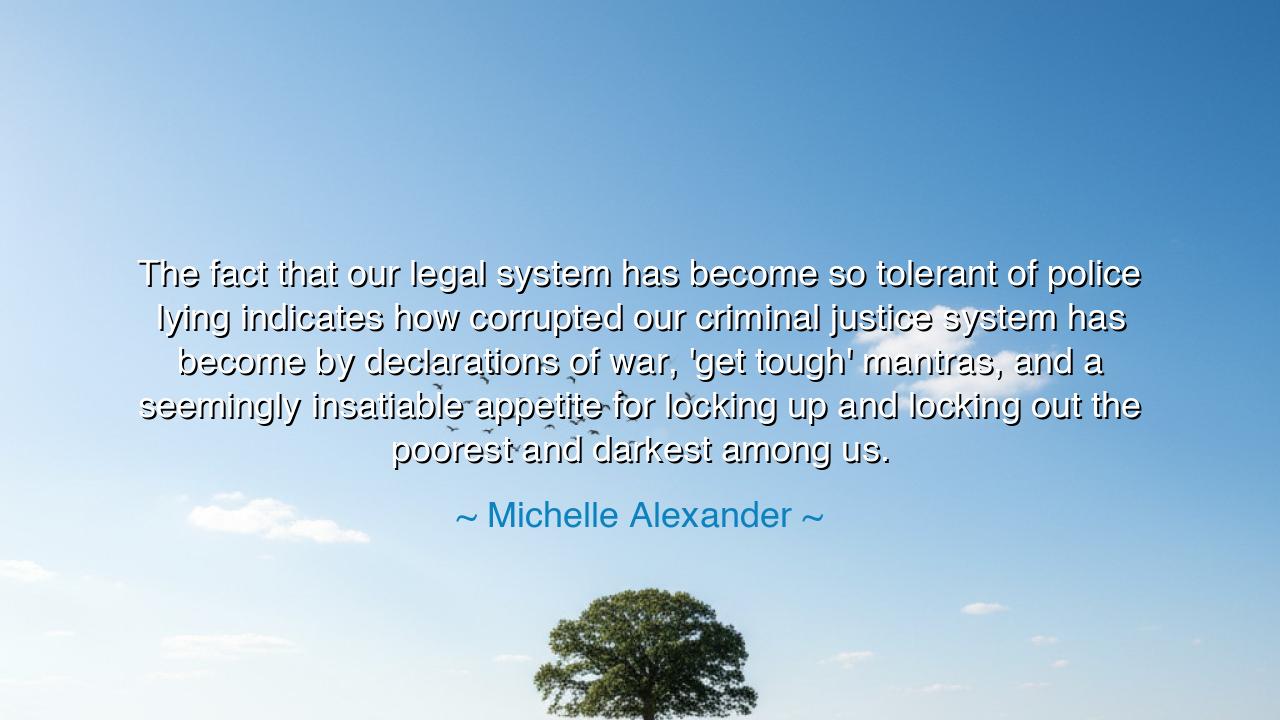
The fact that our legal system has become so tolerant of police
The fact that our legal system has become so tolerant of police lying indicates how corrupted our criminal justice system has become by declarations of war, 'get tough' mantras, and a seemingly insatiable appetite for locking up and locking out the poorest and darkest among us.






“The fact that our legal system has become so tolerant of police lying indicates how corrupted our criminal justice system has become by declarations of war, ‘get tough’ mantras, and a seemingly insatiable appetite for locking up and locking out the poorest and darkest among us.” Thus spoke Michelle Alexander, whose words strike like thunder over a sleeping nation. Her voice rises not from bitterness, but from truth — truth gathered from the wounds of generations. In this single sentence, she exposes a sickness that festers beneath the skin of law itself: the corruption of justice by fear, by prejudice, and by the lust for control. Her words are both lament and warning, reminding us that when truth itself becomes negotiable, the foundation of civilization begins to crumble.
In her phrase, “tolerant of police lying,” Alexander reveals not a minor flaw, but a grave moral collapse. The law was meant to be a covenant between the rulers and the ruled — a sacred trust built upon honesty, fairness, and the pursuit of truth. Yet when those entrusted to uphold the law are permitted to twist it — when falsehood is excused in the name of order — then justice no longer serves the people; it serves power. The police, who once were meant to be guardians of peace, become soldiers in a war — not against crime, but against the citizens themselves.
This corruption, Alexander tells us, did not appear overnight. Its roots lie in the “declarations of war” that politicians once cried to win the hearts of the fearful — the War on Drugs, the War on Crime, the endless chant of “law and order” that promised safety but delivered subjugation. Under these banners, laws were hardened, discretion was lost, and compassion was condemned as weakness. In this war, the battlefield became the streets of the poor, and the casualties were truth, mercy, and humanity itself. The criminal justice system, once a temple of reason, became an engine of punishment.
Consider the story of Kalief Browder, a young man of the Bronx, accused of stealing a backpack — a crime he did not commit. He was imprisoned for three years without trial, much of it in solitary confinement. The machinery of “justice” moved too slowly to care. The police who accused him never faced consequence for their lies. When at last he was released, the damage was done; his spirit, once fierce and bright, was broken. In time, he took his own life. His death was not his alone — it was the symptom of the system Michelle Alexander speaks of: a structure that locks up and locks out the poor and the powerless, while excusing deceit in the name of security.
Her words call to mind the ancient philosophers, who taught that truth is the foundation of law. Plato warned that when rulers lie for the sake of control, the state itself decays. Cicero said that justice cannot exist where falsehood is allowed to live. And yet, in our modern age, the lie has been sanctified — not shouted in darkness, but whispered in courtrooms and police stations, dressed in the uniform of authority. The “get tough” mantras that Alexander condemns are but echoes of fear — the same fear that once justified slavery, segregation, and internment. Fear, when given power, becomes cruelty.
And so she speaks of an “insatiable appetite for locking up and locking out the poorest and darkest among us.” This hunger is not natural — it is taught, cultivated, and fed by a system that profits from pain. For every cell filled, there are companies enriched; for every community policed, there are votes secured. Thus, oppression wears the face of legality, and injustice cloaks itself in the language of safety. But no nation can imprison its way to peace. No society can build justice on the bones of the innocent.
The lesson, then, is both moral and eternal: a system that tolerates deceit cannot stand. When truth is sacrificed for expedience, when law bends to the will of power, when the poor and the marginalized are treated as enemies instead of citizens — the whole body of justice begins to rot from within. To heal it, we must return to the heart of righteousness: truth, accountability, and compassion. The police must be bound by the same honesty they demand of the people. The courts must seek not convictions, but justice. The citizens must no longer remain silent when lies wear badges or robes.
So remember, O listener: the power of a nation is not measured by the number of its prisons, but by the purity of its truth. When lies become law, rebellion becomes duty. Michelle Alexander’s words are a call to awaken — to see that the war against the poor is a war against justice itself. Let us then become guardians of truth once more. Let every law, every policy, every judgment be weighed not by its severity, but by its humanity. Only then shall the system be cleansed, and the word “justice” regain the holiness it has lost.






AAdministratorAdministrator
Welcome, honored guests. Please leave a comment, we will respond soon